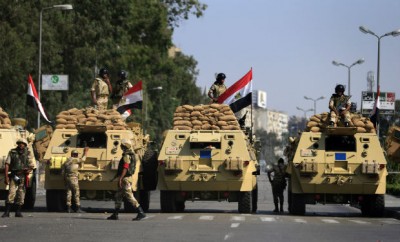The Mubarak “Return”. Will Egypt Slip into Civil War?

More deaths in Egypt yesterday – 50 and counting. Some call it a massacre. Is there another word for it?
This prompted Essam el-Erian of the Muslim Brotherhood to demand the reversal of the ‘fascist coup government.’
Meanwhile there was a spirited debate on Democracy Now: when is a coup a coup and what kind of coup means what kind of future.
Everyone is spinning everything. Can the spinning be controlled if the streets become uncontrollable?
Everybody in Egypt is under tremendous strain, including the pundits on all sides. Meanwhile the New York Times reports the election roadmap: there will be amendments to the constitution, then parliamentary elections will be held in February, which will set the stage for Presidential elections in the future. When the Presidential elections will be held is unknown. The Guardian reports the same scenario.
That is, if the country doesn’t slip into civil war.
How likely is civil war? We know that there is no going back. President Morsi and the Muslim Brotherhood will not be returning to power. What’s up ahead is unknown. Is it possible that the Egyptian army will lose control?
Right now the Presidential election seems a long way off. One can only imagine what might happen during the interim, especially after the coup and the violence yesterday.
Of course, American aid and coordination with Israel is unaffected. The crackdown on the press continues. How are issues to be debated for the upcoming elections if the press is muzzled and dissenters of all stripes are monitored, beaten and jailed? How can Egypt hold together if the press is unmuzzled and dissenters on all sides are allowed to roam free?
Deutsche Welle, Reuter AlertNet and LinkTV report that women are being assaulted and gang raped – as a political tool? For some this might seem ancillary to the debate about the future of Egypt. Perhaps. Or is assault and rape being used as a political weapon of choice to help shape the future?
The Egyptian police are revising their history. They now contend that the Muslim Brotherhood was responsible for the killings in the days before Mubarak’s ouster. The police were innocent. Their point of view: Doesn’t the now deposed traitorous government and the violence of the Muslim Brotherhood prove their innocence?
Egypt is spiraling out of control and only an ever expanding martial law can contain the violence that the army, too, is partaking in and in some case may be instigating. Is there an alternative to ever expanding military control?
Will Egyptian progressives and their supporters continue to justify the army’s expanding powers? Having initially sided with the military, they may have little choice.
A deal will be struck. That deal will be with the Mubarak holdovers in the army, judiciary, moneyed elites and elsewhere that never went away and have now reasserted their power. How future oriented does that sound?
Revolutions hide continuities in tradition, culture and power – for a while. They appear in different guises – for a while. Sometimes they reappear – and remain.
The reality is that the post-Mubarak era is looking more like the pre-Mubarak era that crystallized in the Mubarak era. Whether in the post-Mubarak Mubarak-like era there will be less repression and more freedom is yet to be seen. So far – not so good.
Under martial law, on the brink of civil war, the Presidential elections are a horizon that seems suspended in the distance. How much blood will be shed in the interim and what that bloodshed will mean for the future of Egypt is the great unknown.
Marc H. Ellis is an author, liberation theologian, and Distinguished Visiting Professor, University for Peace, Costa Rica.

